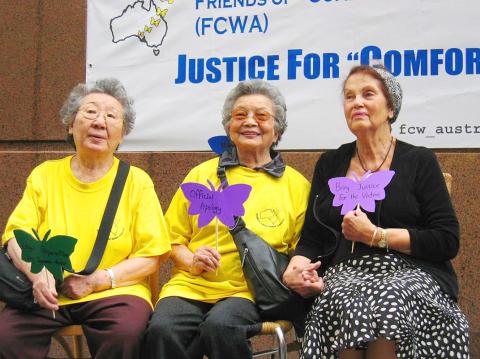The Taipei Women’s Rescue Foundation yesterday confirmed that the oldest comfort woman in the world, Huang Wu Hsiu-mei (黃吳秀妹), passed away from respiratory failure on Oct. 3 at the age of 96.
“Before she did not want to talk publicly about her experiences, out of concern for her family’s feelings, but after receiving positive responses from many people, she became more willing to speak for all the comfort women and attended events in Japan, Australia, and South Korea,” foundation chairperson Huang Shu-ling (黃淑玲) said.
According to the foundation, Huang Wu Hsiu-mei was forced to become a comfort woman by the Japanese colonial government in 1940 and was sent to China’s Guangdong Province to serve the Japanese Imperial Army.

Photo: EPA / Taipei Womens Rescue Foundation
Speaking about her experience, she once said: “I was mistreated badly and my health has been poor since then. The Japanese government may forget, but I will never forget [what happened].”
“Grandma Hsiu-mei” was an active spokesperson seeking justice for comfort women and demanding compensation from the Japanese government.
Foundation officials said about 50 comfort women have passed away in the past 20 years; only eight are now left in Taiwan, with an average age of 87. They have yet to receive an apology or admission of wrongdoing from the Japanese government, foundation officials said, so there is still much work to be done to seek justice for these elderly victims.
The foundation is planning a memorial for “Grandma Hsiu-mei” on Dec. 9, which is to coincide with the 20-year anniversary event to commemorate the start of the movement in support of Taiwanese comfort women.

US President Donald Trump said "it’s up to" Chinese President Xi Jinping (習近平) what China does on Taiwan, but that he would be "very unhappy" with a change in the "status quo," the New York Times said in an interview published yesterday. Xi "considers it to be a part of China, and that’s up to him what he’s going to be doing," Trump told the newspaper on Wednesday. "But I’ve expressed to him that I would be very unhappy if he did that, and I don’t think he’ll do that," he added. "I hope he doesn’t do that." Trump made the comments in

NOT AN OPENING: Trump’s violation of international law does not affect China’s consideration in attacking Taiwan; Beijing lacks capability, not precedent, an official said Taiwanese officials see the US’ capture of the president of Venezuela as a powerful deterrent to Beijing’s aggression and a timely reminder of the US’ ability to defeat militaries equipped with Chinese-made weapons. The strikes that toppled Venezuelan President Nicolas Maduro signaled to authoritarian leaders, including Chinese President Xi Jinping (習近平), US President Donald Trump’s willingness to use military might for international affairs core to US interests, one senior official in Taipei’s security circle said. That reassured Taiwan, the person said. Taipei has also dismissed the idea that Trump’s apparent violation of international law could embolden Beijing, said the official, who was not

A cold surge advisory was today issued for 18 cities and counties across Taiwan, with temperatures of below 10°C forecast during the day and into tonight, the Central Weather Administration (CWA) said. New Taipei City, Taipei, Taoyuan and Hsinchu, Miaoli and Yilan counties are expected to experience sustained temperatures of 10°C or lower, the CWA said. Temperatures are likely to temporarily drop below 10°C in most other areas, except Taitung, Pingtung, Penghu and Lienchiang (Matsu) counties, CWA data showed. The cold weather is being caused by a strong continental cold air mass, combined with radiative cooling, a process in which heat escapes from

Snow this morning fell on Alishan for the first time in seven years, as a strong continental cold air mass sent temperatures plunging across Taiwan, the Central Weather Administration (CWA) said. The Alishan weather station, located at an elevation of about 2,200m in central Taiwan, recorded snowfall from 8:55am to 9:15am, when the temperature dropped to about 1°C, the CWA said. With increased moisture and low temperatures in the high-altitude Alishan area, the conditions were favorable for snow, CWA forecaster Tsai Yi-chi (蔡伊其) said. The last time snow fell at the Alishan weather station was on Jan. 10, 2018, while graupel fell there